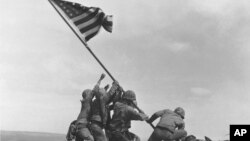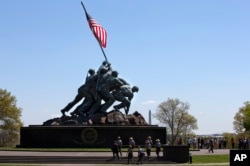The U.S. Marine Corps said Thursday that it had misidentified one of the men in an iconic photograph showing the raising of the American flag on Iwo Jima during World War II.
The Marines created a review panel this year after two amateur historians working for the Smithsonian Channel raised doubts about the identity of one of the Marines.
The panel agreed with the historians that Private First Class Harold Schultz of Detroit was in the photo and that Navy Pharmacist's Mate 2nd Class John Bradley was not. Schultz died in 1995.
The other Marines in the photo were Rene Gagnon, Ira Hayes, Harlon Block, Michael Strank and Franklin Sousley.
'Ensure it's right'
"Our history is important to us, and we have a responsibility to ensure it's right," Marine Commandant Gen. Robert Neller said Thursday in a statement.
The well-known image shows six Marines raising the U.S. flag atop Mount Suribachi during a bloody battle on the Japanese island. The photograph, taken by Associated Press photographer Joe Rosenthal in February 1945, also was used as the basis for an enormous bronze statue at Arlington National Cemetery near Washington, D.C.
"Although the Rosenthal image is iconic and significant, to Marines it's not about the individuals and never has been. Simply stated, our fighting spirit is captured in that frame, and it remains a symbol of the tremendous accomplishments of our Corps — what they did together and what they represent remains most important. That doesn't change," Neller's statement continued.
Bradley's son, James Bradley, wrote the best-selling book Flags of Our Fathers about the flag-raisers. It was later made into a movie directed by Clint Eastwood.
Bradley, who expressed shock in May when the Marine Corps began its investigation, declined to comment to the AP on Thursday when reached by phone.
His publisher, Random House, released a statement Thursday saying Bradley would update an afterword for his book that explained the new information.
Two flag-raisings
The historians found the discrepancy after viewing photos from an earlier flag-raising and a second one, which Rosenthal captured.
In May, Bradley had told AP he believed his father confused the first and second raisings of the flag.
Iwo Jima is part of the cluster of Japanese Volcano Islands south of Tokyo. It was the site of an intense 36-day battle that began on February 19, 1945, and involved about 70,000 U.S. Marines and 18,000 Japanese soldiers. More than 6,500 U.S. servicemen died in the battle.
The capture of Iwo Jima was strategically important to the U.S. because it prevented Japanese planes from taking off from there and intercepting American bombers.
Some material for this report came from AP and AFP.

